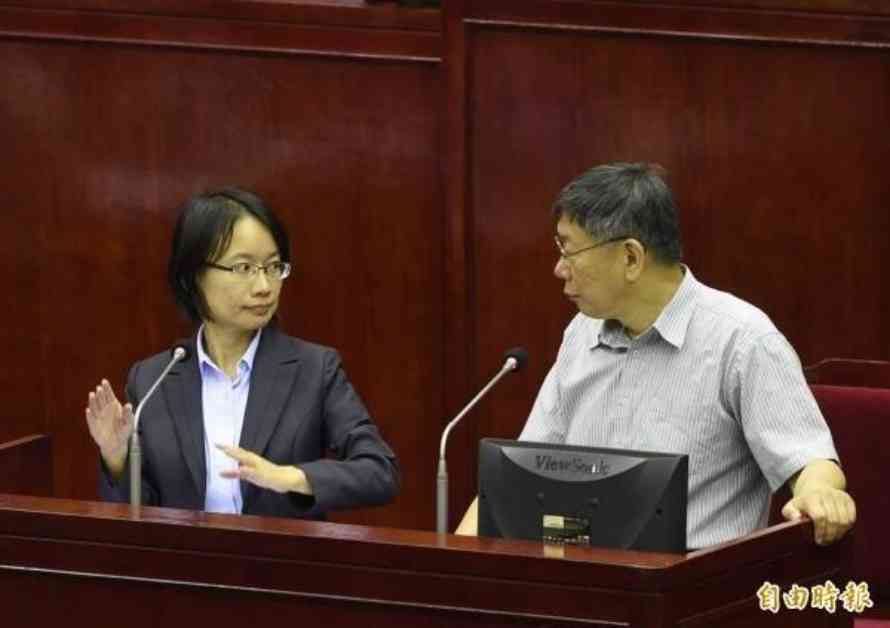Mayor Ko Wen-je Accuses Wu Yin-ning of Corruption in Fish Market Redevelopment Project
Taipei Mayor Ko Wen-je has found himself embroiled in a heated controversy with former Taipei Agricultural Products Marketing Corporation (TAPMC) General Manager Wu Yin-ning over the redevelopment project of the First Fruit and Vegetable Market. This project has become a ticking time bomb for Mayor Ko, with accusations of corruption flying from all sides.
The redevelopment project, which has been a focal point of contention, has been linked to the Wei Ching Group’s subsidiary, China Engineering. Allegations have surfaced that Mayor Ko engaged in “subtractive contracting,” a practice that effectively ties bids to specific companies. Wu Yin-ning recently took to social media in the early hours of the morning to shed light on the project’s design phase, revealing that her proposal to save 11 billion NT dollars was dismissed by Mayor Ko in a fit of anger.
Wu Yin-ning’s Version of Events
Wu Yin-ning recalled her tenure as the General Manager of TAPMC, which began in June 2017. She immediately identified the First Fruit and Vegetable Market redevelopment project as a top priority. The market, in operation since 1974, was a crucial hub for the auctioning of fruits and vegetables in Taiwan. Wu Yin-ning convened meetings of the market’s redevelopment task force, personally overseeing each session. During these meetings, she discovered that Taipei City Government’s initial plans for the project did not align with the practical operational needs of the market.
Concerned that spending over 100 billion NT dollars on the project could result in a subpar outcome that would adversely impact not only TAPMC but also Taiwan’s fruit and vegetable distribution, Wu Yin-ning proposed a revised redevelopment plan in September 2017. This new plan included raising building floors, improving transportation routes, and reducing the size of the grand hall, ultimately saving 11 billion NT dollars. Despite her repeated attempts to persuade Mayor Ko to adopt her proposal, Wu Yin-ning faced constant disregard from the city government.
Confrontation and Allegations of Corruption
The tension came to a head on August 30, 2018, when Councilor Chien Shu-pei queried Mayor Ko about the existence of a cost-saving alternative for the redevelopment project. When pressed about why the cheaper option was not being considered, Mayor Ko reacted explosively, accusing Wu Yin-ning of ignorance and insinuating corruption. Wu Yin-ning questioned Mayor Ko’s extreme reaction, suggesting that it hinted at a hidden vulnerability.
Accompanying Mayor Ko at the time was former Deputy Mayor Peng Chen-sheng, known for his controversial statement advocating for the execution of those involved in profiteering. Additionally, figures such as Lin Chung-chieh, the Director of the Department of Economic Development, and Hsu Hsuan-mou, the Director of the Market Administration Department, were also involved in the market redevelopment project contracted to China Engineering, a subsidiary of the Wei Ching Group. Wu Yin-ning emphasized the need for a thorough investigation to unveil the truth behind these dealings.
As the controversy surrounding the Fish Market redevelopment project continues to unfold, it is evident that the layers of complexity and potential corruption have yet to be fully exposed. The accusations and counter-accusations between Mayor Ko Wen-je and Wu Yin-ning only serve to highlight the murky waters in which the city’s political landscape operates. The implications of these allegations extend beyond the immediate project at hand, raising broader questions about transparency, accountability, and ethical conduct within Taipei’s governance.
Conclusion
In conclusion, the clash between Taipei Mayor Ko Wen-je and former TAPMC General Manager Wu Yin-ning over the Fish Market redevelopment project underscores the challenges and controversies inherent in urban development initiatives. The allegations of corruption and misconduct have cast a shadow over the project, calling into question the integrity of the decision-making process and the motivations behind key stakeholders’ actions. As the investigation unfolds and more details come to light, it is essential for transparency, accountability, and ethical governance to prevail in ensuring the public’s trust and confidence in Taipei’s administration.












